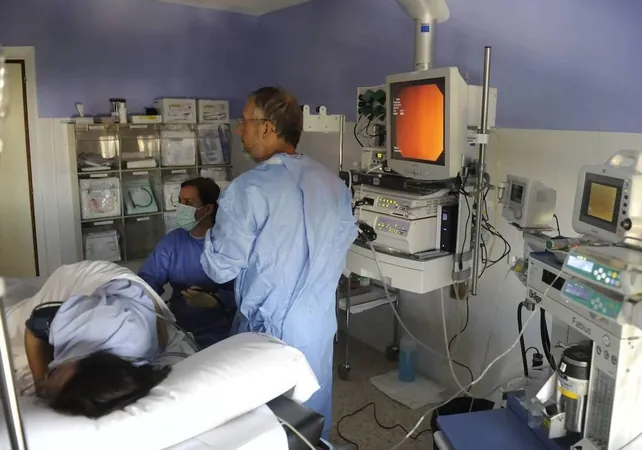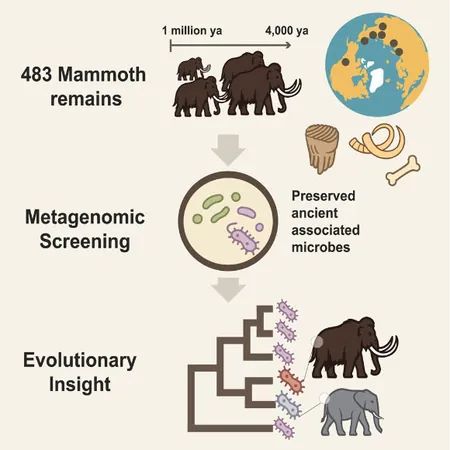
Colorectal Cancer Rates Surge in Malaga, But Survival Rates Climb with Early Detection
2025-09-01
Author: Ming
Malaga's Colorectal Cancer Crisis
In a startling report, colorectal cancer has become the most frequently diagnosed cancer in Malaga, with a staggering 1,400 new cases projected for 2024. This figure has surged nearly 25% over the past decade, surpassing breast, prostate, and lung cancers, which are also on the rise.
Rising Survival Rates Fuel Hope
While incidences are climbing, so too are survival rates. Over 60% of colorectal cancer patients are now expected to overcome the disease, especially if detected early. Dr. Laura Medina, an oncologist at HM Hospitales, emphasizes the crucial connection between early diagnosis and enhanced survival.
Changing Lifestyles Behind the Surge
Dr. Medina attributes this alarming increase in diagnoses to our increasingly sedentary lifestyles and poor dietary choices. With a rise in stress and a decline in healthy eating, the risk of digestive cancers, including colon cancer, is skyrocketing, particularly among younger individuals. "The trend is worrying, as we’re seeing more cases in under-50s, a group that traditionally has been less affected," she warned.
Recognizing the Symptoms
Awareness of the disease is crucial. Symptoms can mimic those of less serious conditions, such as bloating or hemorrhoids. Dr. Medina urges vigilance: "If you experience unexplained abdominal pain, significant changes in bowel habits, or rectal bleeding, it's essential to consult a doctor promptly." Early recognition can be life-saving.
Prevention is Better Than Cure
The keys to prevention lie in a varied diet rich in fiber, fruits, and vegetables, combined with regular exercise and stress reduction. Avoiding tobacco and limiting alcohol could prevent nearly 30% of all cancers, including those of the digestive tract.
Screening Saves Lives
Dr. Medina encourages both men and women aged 50 and over to undergo screening for colon cancer, which includes a simple fecal occult blood test. A positive result warrants a colonoscopy, a critical tool in the early detection of cancer.
Declining Mortality Rates
Thanks to improved screening and prevention strategies, mortality rates from colorectal cancer are declining. Early detection remains the cornerstone of effective treatment. According to Dr. Medina, patients who undergo surgery have a remarkable survival rate, with 90% alive five years post-operation. For those diagnosed with metastases, the average survival has improved significantly, from 24 to 36 months.
New Challenges Ahead
While advances in early detection are vital, the worrying trend of younger patients being diagnosed underlines a growing public health crisis. The average age of patients treated two decades ago was 55; today, it’s alarmingly lower, with cases in individuals under 40 becoming more frequent.
Hope Through Innovation
As research continues, the focus is shifting towards identifying genetic mutations that may offer new treatment possibilities. With ongoing awareness campaigns and a push for early detection, there remains hope for better outcomes and prolonged lives for those affected by this aggressive disease.




 Brasil (PT)
Brasil (PT)
 Canada (EN)
Canada (EN)
 Chile (ES)
Chile (ES)
 Česko (CS)
Česko (CS)
 대한민국 (KO)
대한민국 (KO)
 España (ES)
España (ES)
 France (FR)
France (FR)
 Hong Kong (EN)
Hong Kong (EN)
 Italia (IT)
Italia (IT)
 日本 (JA)
日本 (JA)
 Magyarország (HU)
Magyarország (HU)
 Norge (NO)
Norge (NO)
 Polska (PL)
Polska (PL)
 Schweiz (DE)
Schweiz (DE)
 Singapore (EN)
Singapore (EN)
 Sverige (SV)
Sverige (SV)
 Suomi (FI)
Suomi (FI)
 Türkiye (TR)
Türkiye (TR)
 الإمارات العربية المتحدة (AR)
الإمارات العربية المتحدة (AR)